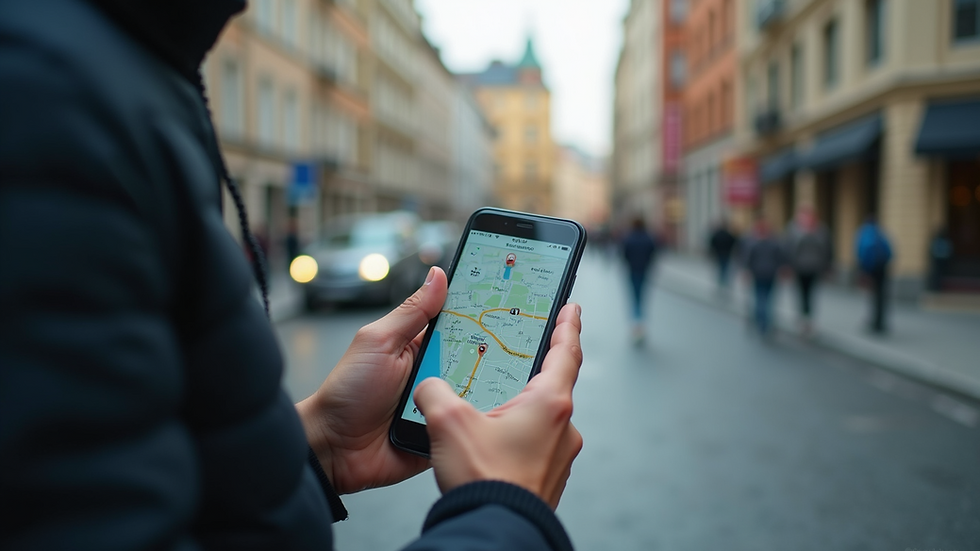IT Solutions: Enhancing Projects with Geolocation Services
- alnazahacompany202
- Jul 27
- 5 min read
In today's fast-paced digital world, businesses are constantly seeking ways to improve their projects and enhance customer experiences. One of the most effective tools at their disposal is geolocation services. These services allow companies to leverage location data to make informed decisions, streamline operations, and provide personalized experiences.
In this blog post, we will explore how geolocation services can enhance various projects, the benefits they offer, and practical examples of their application. Whether you are a project manager, a business owner, or simply curious about technology, this post will provide valuable insights into the world of geolocation.
Understanding Geolocation Services
Geolocation services use technology to determine the physical location of a device, such as a smartphone or computer. This information can be used in various ways, from tracking deliveries to providing location-based marketing.
Some common technologies that enable geolocation include:
GPS (Global Positioning System): This satellite-based system provides accurate location data.
Wi-Fi Positioning: This method uses nearby Wi-Fi networks to determine a device's location.
Cell Tower Triangulation: This technique uses signals from cell towers to estimate a device's location.
By combining these technologies, businesses can gain a comprehensive understanding of their customers' locations and behaviors.
Benefits of Geolocation Services
Geolocation services offer numerous benefits that can significantly enhance projects. Here are some key advantages:
1. Improved Customer Experience
By utilizing geolocation data, businesses can provide personalized experiences to their customers. For example, a retail store can send special offers to customers' smartphones when they are nearby. This not only increases foot traffic but also enhances customer satisfaction.
2. Enhanced Operational Efficiency
Geolocation services can streamline operations by optimizing routes for delivery drivers. For instance, a logistics company can use real-time location data to determine the fastest route, reducing fuel costs and delivery times.
3. Better Data Insights
Geolocation data provides valuable insights into customer behavior. Businesses can analyze where customers spend their time and tailor their marketing strategies accordingly. This data-driven approach can lead to more effective campaigns and higher conversion rates.
4. Increased Safety and Security
In industries such as transportation and logistics, geolocation services can enhance safety. Companies can track their vehicles in real-time, ensuring that drivers are safe and that deliveries are on schedule.
5. Competitive Advantage
Incorporating geolocation services can give businesses a competitive edge. Companies that leverage location data can respond to market trends faster and offer services that meet customer needs more effectively.
Practical Applications of Geolocation Services
Now that we understand the benefits, let's explore some practical applications of geolocation services across different industries.
Retail
In the retail sector, geolocation services can transform the shopping experience. For example, a clothing store can use location data to send personalized promotions to customers when they are near the store. This strategy not only drives sales but also fosters customer loyalty.
Additionally, retailers can analyze foot traffic patterns to optimize store layouts and product placements. By understanding where customers spend the most time, businesses can make informed decisions about inventory and marketing strategies.
Transportation and Logistics
Geolocation services are crucial in the transportation and logistics industry. Companies can track shipments in real-time, providing customers with accurate delivery estimates. This transparency builds trust and enhances customer satisfaction.
Moreover, logistics companies can optimize delivery routes using geolocation data. By analyzing traffic patterns and road conditions, they can reduce delivery times and costs, ultimately improving their bottom line.
Tourism and Hospitality
In the tourism and hospitality sector, geolocation services can enhance the travel experience. Hotels can use location data to recommend nearby attractions and restaurants to guests. This personalized approach can lead to higher customer satisfaction and positive reviews.
Tourism apps can also provide real-time navigation and information about local events, making it easier for travelers to explore new destinations. By leveraging geolocation, businesses can create memorable experiences for their customers.
Healthcare
In healthcare, geolocation services can improve patient care and operational efficiency. For instance, hospitals can track the location of medical equipment and staff, ensuring that resources are available when needed.
Additionally, geolocation can be used to monitor patients' locations in real-time, allowing healthcare providers to respond quickly in emergencies. This technology can enhance patient safety and improve overall care.
Real Estate
In the real estate industry, geolocation services can provide valuable insights for buyers and sellers. Real estate apps can show properties available in specific areas, along with information about schools, parks, and amenities.
By using geolocation data, real estate agents can target potential buyers more effectively, showcasing properties that meet their needs based on location preferences.
Challenges of Implementing Geolocation Services
While the benefits of geolocation services are clear, there are also challenges to consider. Here are some common obstacles businesses may face:
1. Privacy Concerns
With the increasing use of geolocation services, privacy concerns have become a significant issue. Customers may be hesitant to share their location data, fearing misuse. Businesses must prioritize transparency and ensure that they comply with data protection regulations.
2. Technical Limitations
Implementing geolocation services requires technical expertise and infrastructure. Businesses may need to invest in new technologies and training to effectively utilize location data.
3. Data Accuracy
The accuracy of geolocation data can vary based on the technology used. For example, GPS may not work well in urban areas with tall buildings. Businesses must choose the right technology to ensure reliable data.
Future Trends in Geolocation Services
As technology continues to evolve, so do geolocation services. Here are some trends to watch for in the coming years:
1. Increased Use of AI and Machine Learning
Artificial intelligence and machine learning will play a significant role in enhancing geolocation services. These technologies can analyze vast amounts of location data to identify patterns and trends, enabling businesses to make more informed decisions.
2. Integration with Augmented Reality
The integration of geolocation services with augmented reality (AR) will create new opportunities for businesses. For example, retailers can use AR to provide virtual tours of their stores, guiding customers to specific products based on their location.
3. Enhanced Personalization
As businesses gather more location data, they will be able to offer even more personalized experiences. This could include tailored recommendations based on a customer's location history and preferences.
4. Greater Focus on Sustainability
Geolocation services can also contribute to sustainability efforts. By optimizing delivery routes and reducing fuel consumption, businesses can minimize their environmental impact.
Real-World Success Stories
To illustrate the power of geolocation services, let's look at a few real-world success stories.
Starbucks
Starbucks has successfully integrated geolocation services into its mobile app. The app uses location data to send personalized offers to customers when they are near a store. This strategy has led to increased foot traffic and sales, demonstrating the effectiveness of location-based marketing.
Uber
Uber revolutionized the transportation industry by leveraging geolocation services. The app allows users to request rides based on their current location, making it easy to connect with drivers. This seamless experience has contributed to Uber's rapid growth and popularity.
Domino's Pizza
Domino's Pizza has embraced geolocation services to enhance its delivery operations. The company uses real-time tracking to provide customers with accurate delivery estimates. This transparency has improved customer satisfaction and loyalty.
The Road Ahead
As we look to the future, it is clear that geolocation services will continue to play a vital role in enhancing projects across various industries. By leveraging location data, businesses can improve customer experiences, streamline operations, and gain valuable insights.
The key to success lies in understanding the needs of customers and using geolocation services to meet those needs effectively. As technology evolves, businesses that embrace these innovations will be well-positioned to thrive in an increasingly competitive landscape.
In summary, geolocation services are not just a trend; they are a powerful tool that can transform how businesses operate and interact with customers. By harnessing the potential of location data, companies can create personalized experiences, improve efficiency, and gain a competitive edge.

As we move forward, the possibilities are endless. Embracing geolocation services today can pave the way for a more connected and efficient tomorrow.



Comments